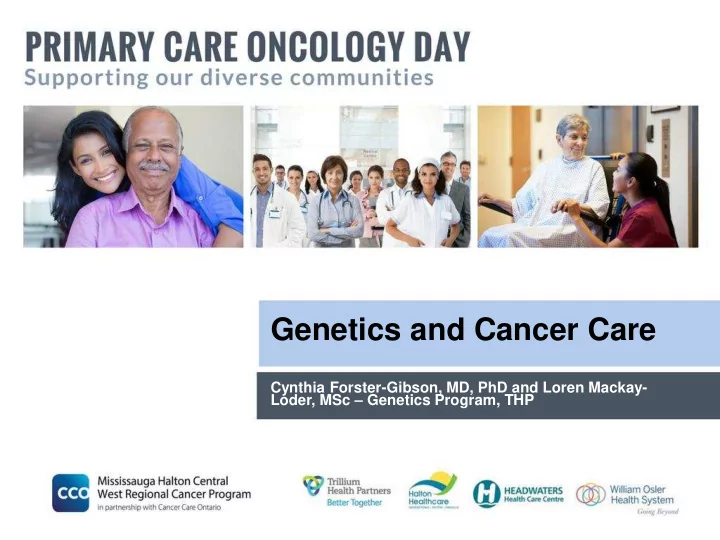

Genetics and Cancer Care Cynthia Forster-Gibson, MD, PhD and Loren Mackay- Loder, MSc – Genetics Program, THP
Faculty/Presenter Disclosure Faculty: Cynthia Forster-Gibson Relationships with commercial interests: None Presenter: Loren Mackay-Loder Relationships with commercial interests: None
Cancer distribution Single gene cause known, 10% Sporadic; 70% Familial; 30% no known gene(s), 20%
How do you identify those appropriate for referral to Genetics Personal history • age(s) at cancer diagnosis • tumour pathology • bilaterality • synchronous tumours • gender • other organ involvement (eg. ovary, stomach, skin)
How do you identify those appropriate for referral to Genetics • Family history • tumour type, age at diagnosis, bilateral, synchronous, gender • maternal and paternal relatives • full and half relationships • affected and unaffected individuals • ethnicity (founder mutations) • any limitations with the family history
Information to include with the referral • If patient is affected • Tumour pathology • If patient is unaffected • Details of family history (including relationship to patient, age at cancer diagnosis, cancer pathology if known • If referral is based on pathogenic variant in the family • Copy of family members genetic test result
The genetic assessment • Family history reviewed • Confirm pathology • Determine if/what testing is appropriate • Identify best testable person • Review pros and cons of testing • Management options (broadly)
Genetic testing • Testing approaches • Single genes • Multigene panels • Results • Pathogenic • Likely pathogenic • Variant of uncertain significance -Periodic review • Benign variants • No variant – uninformative – not negative- Family history remains important • Reclassification
New complexities of genetic testing • Panel testing • Increased chance of one or more VUS • Positive test result that doesn’t match the personal or family history • Some genes of limited value/information
Resources • THP Clinical Genetics website • http://trilliumhealthpartners.ca/patientservices/geneti cs/Pages/default.aspx • Referral form • https://trilliumhealthpartners.ca/patientservices/gene tics/Documents/3991_DHR_Familial_Cancer_Genet ics_Referral_Form_Fillable.pdf
What to discuss with your patient? • Genetic factors are risk factors • Clue to their presence may be personal and/or family history
Sporadic vs Hereditary Cancer H H http://www.web-books.com/eLibrary/Medicine/Cancer/04MB9.html ttp://www.web-books.com/eLibrary/Medicine/Cancer/04MB9.html http://www.web- books.com/eLibrary/Medicine/Cancer/04MB9.html
What to discuss with your patient? • Knowledge of your genetic status may: • Give you a better estimate of your specific cancer risks • Determine if you need a specialized screening program for early detection • Allow you to take measures (prophylactic surgery, chemoprevention) to reduce your risk • Heighten (your) primary care provider’s awareness of your specific cancer risks • Help you understand your children’s (and other family members’) risks
What to discuss with your patient? • Genetic factors are universal risk factors • Regardless of ethnic background, cultural practices • They may inherited or new • Your patient did not do anything to make this happen • They are there from conception to death • If you know about them, you may be able to decrease your risk of cancer or find it early
http://www.cancer.gov/about-cancer/causes-prevention/genetics/overview-pdq
How does ethnic variation influence testing or test interpretation? • Specific pathogenic variants exist in specific ethnic groups • BRCA1 and BRCA2 – 3 specific pathogenic variants in individuals of Ashkenazi Jewish descent • specific variants in Icelanders, French Canadians, Portugese etc • Our knowledge of rare variants in some ethnic groups is limited • Our knowledge of cancer risk genes in some groups is limited (Filipinos, Jamaicans etc) – not studied well, ethnic diversity
What to discuss with your patient? • Barriers • Evidence for reduced provincial cancer screening in some immigrant populations • Reasons are complex, include cultural, physician, financial factors • Language – need for a translator • Type of cancer
Factors that should influence management choices/discussions • High risk gene? • BRCA1, BRCA2 • PTEN, STK11, CDH1, PALB2, TP53 • Lynch-associated – MSH2, MSH6, MLH1, PMS2, EPCAM • Moderate risk gene? • CHEK2 – particularly with positive family history, ATM, NBN • Cancer risk not necessarily clear • Family History
How to support your healthy (“unaffected”) high risk patient • Genetic factors are lifelong risk factors • Decision-making will be different at different life stages • Management will change over time and should be reviewed periodically • NCCN https://www.nccn.org/professionals/physicia n_gls/default.aspx
How to support your high risk patient with cancer • Genetic factors may alter the treatment plan (eg. PARP inhibitors in women with ovarian cancer who have a BRCA2 pathogenic variant) • There may be risks for other cancer types • Decision-making will be different depending on their health status • Management will change over time and should be reviewed periodically • NCCN https://www.nccn.org/professionals/physician_ gls/default.aspx
Thanks! Questions?
Recommend
More recommend